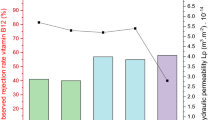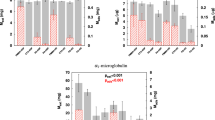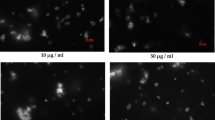Abstract
IN an investigation of the relation of the hæmolytic activity of sodium cetyl sulphate and sodium lauryl sulphate to their adsorption to red blood cells, we found that hæmolysis only starts when a minimum quantity of the detergent is really fixed to the cell walls1,2. On the assumption that such hæmolysis does not necessarily involve a unique mechanism, we undertook the study of the relationship between hæmolysis and adsorption for a bile acid derivative.
This is a preview of subscription content, access via your institution
Access options
Subscribe to this journal
Receive 51 print issues and online access
$199.00 per year
only $3.90 per issue
Buy this article
- Purchase on Springer Link
- Instant access to full article PDF
Prices may be subject to local taxes which are calculated during checkout
Similar content being viewed by others
References
Ruyssen, R., and Croes, R., Med. Kon. Vlaam. Acad. Wetensch. Belg., 12, 4 (1950).
Croes, R., and Ruyssen, R., Bull. Soc. Chim. Biol., 33, 1837 (1951).
Ponder, E., “Hemolysis and Related Phenomena” (London, 1948).
Pethica, B. A., and Schulman, J. H., Nature, 170, 117 (1952).
Author information
Authors and Affiliations
Rights and permissions
About this article
Cite this article
CROES, R., RUYSSEN, R. Adsorption and Hæmolytic Action of Diacetyldeoxycholate. Nature 171, 846–847 (1953). https://doi.org/10.1038/171846a0
Issue Date:
DOI: https://doi.org/10.1038/171846a0
This article is cited by
-
Hæmolytic Effects of Steroids
Nature (1964)
Comments
By submitting a comment you agree to abide by our Terms and Community Guidelines. If you find something abusive or that does not comply with our terms or guidelines please flag it as inappropriate.



